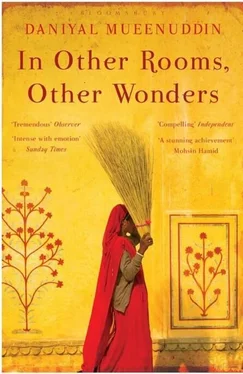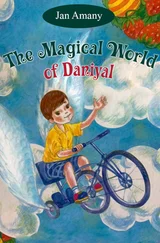They sat for a moment in the car. She leaned over awkwardly from her seat and kissed his neck. She kissed him on the lips, her tongue in his mouth, his face tasting of salt.
‘I’m okay,’ he said, pulling himself together. ‘It’s okay.’ He unfurled the map.
She picked randomly. ‘Let’s spend the night here. I like the sound of it, Beaugency. It’s on the river.’
She took out the guide and read aloud to him about the town as they drove through the streets and then along the Loire, the sky becoming dusky, the clouds first orange and then red.
At the Auberge Maille d’Or in Beaugency, an old posting inn hovering between tight-lipped poverty and seediness, with the plaster cracked and paint chipping on the iron bed frame, their room looked onto a courtyard paved with cobblestones, with a fountain at the far end and, in the gloom along the wall, green plastic crates filled with empty beer bottles. They were the only guests and had what would pass for the best room, at the end of a long gallery on the second floor, with big windows. ‘I love run-down hotels,’ Sohail said. He turned on the TV and found a channel showing cartoons, dubbed in French. Helen moved about the big bare room putting away her things, her toiletries in the bathroom, hanging up her clothes.
At dinner they ordered a second bottle of wine. Helen became giggly and afterward asked him to drive her along the river, which glittered and then ran dark under the arches of an old stone bridge. Back at the hotel, a fat black kitten with white paws stuck its nose around the door of the reception desk.
‘Look, it’s our country cat,’ she said, tipsy, looking down at it. She knew she was looking pretty, she had been flirting with Sohail all evening, and now she wanted to hold the little kitty, it would suit her. The kitten looked up with wide green eyes, intent, face uplifted like a little black bowl, its feet splayed. It turned and raced out the door, skidding on the tiled floor, chubby tail standing upright.
‘Viens, viens,’ she called, rolling the unfamiliar French word on her tongue, playing at being a little girl.
The kitten slipped behind the beer crates and would not emerge. The long courtyard shaded away into darkness, its silence broken by the splashing sound of the unseen fountain.
Helen sat on her haunches, calling. The kitten came out toward her a few feet, but when she moved forward it scrambled away again, its little white paws flashing.
She sat back and looked up at the stars, at the moon framed by the pollarded branches of a lime tree, stark without leaves. The same stars lit the snowfield behind her house in Connecticut. She would never again be twenty-one in an old hotel in the Loire Valley in France. ‘I can’t believe Paris is over,’ she said, very softly, because she knew that Sohail was nearby, watching her. Fluidly she stood up, made a kissing sound toward the kitten, and walked back to him.
In their room she led him onto the bed and pulled his clothes off, threw off her own, raising her legs in the air to push off her panties, biting him, his nipples. The loose bedsprings made long rusty sounds, like a knife leisurely sharpened on a whetstone.
Afterward, she stood in the window with a blue-printed cotton scarf wrapped around her body like a sarong, looking out over the courtyard. The kitten ambled on the path beneath their room, on its fat clumsy legs. She called to it, ‘Hello, kitty cat.’
In the morning a heavy mist lay over the winter fields. They drifted south on narrow country roads, Helen driving. She drove fast, not smoothly but with a kind of angularity, from point A to point B. A hare burst from the woods on their left, crossed the road, and then bounded over a plowed field. Helen stopped the car, and they watched it lope far across the field and into the woods on the other side.
At Chenonceaux rain began to fall lightly, as if the mist were dissolving. The brown wooded bank on the far side of the river Cher set off the quirky, light chÀteau, which seemed too playful to be a house, too fantastical, its towers and filigree, its position astride the river. The current as it flowed through the arches, rippling and white, appeared to Helen to be towing the chÀteau out to sea.
A fire burned in the guardroom, and they stood in front of it. Through the windows they could see the gray water flowing underneath. Helen wandered away from Sohail and up some stairs into a dark room — a bedroom — belonging to some widowed queen. She stared for a long time out the window, west, down the river as it flowed to the sea. Soon she would be going back there, to classes, to the snow in New Haven, to the old beaten-up car that she loved. Every few weeks she drove into the country to visit her mother, who would open a bottle of sparkling wine to celebrate. Now, she thought. Now, now it’s time. It can’t wait any longer .
She found him in Catherine de Medici’s little study, which hangs out over the water like the cockpit of a plane, glassed on three sides. ‘I’ve been looking for you, baby,’ said Sohail.
Helen leaned her body against him, put her head on his shoulder. ‘Let’s go home,’ she said.
‘Do you mean to the inn in Montrésor?’
‘No, I mean Paris.’
‘What about New Year’s?’
‘Let’s be in Paris. I need to, I really do. We’ll walk along the Seine. It’s only three hours away.’
He didn’t ask why. Returning to the car, Sohail insisted on stopping to see the maze. The hedges stood only to waist level, and so she watched him as he worked his way through it. It wasn’t fun, she knew it wasn’t fun for him, but he had to do it, pretending to play. He looked so beautiful in the rain.
Wearing an odd, determined look, he took a long time to get through, then succeeded and stood on the little platform in the center. ‘Look, I made it,’ he whispered, just audible.
Almost with horror she watched him approach her, then stand in front of her, looking into her face, and she hardened herself to meet him, eyes dimming, seeing through him, willing herself to remember the centuries, the kings and their queens who had walked here, seen this river, this wet forest — and now their loves blown away, their pain.
Part I: Islamabad
Lily had been to parties all week, month, endlessly, drinking, rarely having dinner. Walking back across the lawn from the bar with a glass of champagne, she stopped to look around her, at the gathering party, the DJ setting up his booth, the waiters in white coats, and felt as if she were an actress in a traveling theater company, once again tonight to go through the same emotions, the same intoxications. For this evening, themed as ‘Night of the Tsunami,’ her friend Mino’s servants had brought in truckloads of sand to make an artificial beach beside his newly built weekend home at Simly Dam — where Mino sat holding court, sprawled on a dhurrie by the water, leaning against a pillow. She found Mino tiresome, though he was perhaps her best friend, found the whole group of them shallow and false — she included herself in the indictment — drifting from party to party, flying out of Isloo, as they called it, to Karachi, to Lahore, on the circuit in the spring weather, jet-propelled. There were only a handful of houses out at Simly Dam, an hour from Islamabad on bad roads, and all were empty, unlit, except this one. The place looked unfinished, the landscape all boulders, red clay hills, rock cliffs falling down to the lake.
‘Oh my God, these people!’ Mino waved dismissively at a couple nosing off to the bar after saying hello. ‘Did you see those two? Daddy-O and his little girl. You’d need dynamite to get him off her.’ Mino wore an embroidered cashmere shawl draped over his well-fleshed arm, his look finished with an extravagant diamond ear stud — a rich jewel in an Ethiop’s ear, he said when asked about it.
Читать дальше












